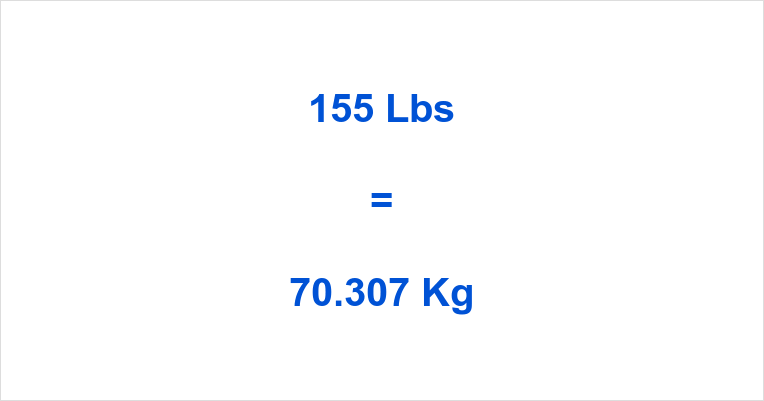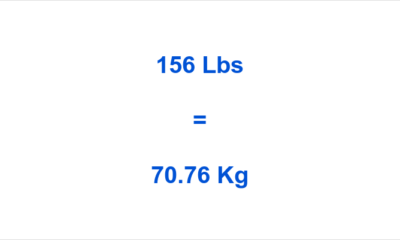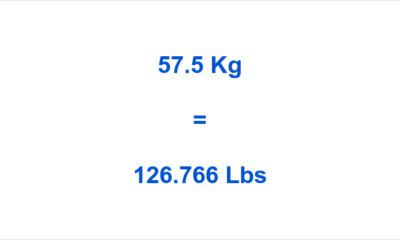Education
88 kg: Understanding Weight, Health, and Lifestyle

Introduction
If you’ve ever wondered what 88 kg (kilograms) means in terms of health, fitness, or even daily life, you’re in the right place! Whether you’re tracking your weight, planning your fitness journey, or just curious about how 88 kg translates into other units, this post will break it all down in an easy-to-understand way.
In this guide, we’ll cover:
- What 88 kg looks like in pounds
- Whether 88 kg is considered healthy
- How to manage weight at 88 kg
- Fitness tips for 88 kg individuals
- FAQs related to weight and health
Let’s dive in!
1. Converting 88 kg to Other Units
Before we get into health and fitness, let’s convert 88 kg into other common weight measurements:
- 88 kg in pounds: 88 kg = 194 lbs (1 kg = 2.20462 lbs)
- 88 kg in stones: 88 kg = 13.86 stones (1 stone = 6.35 kg)
If you’re used to measuring weight in pounds or stones, now you have a better sense of what 88 kg looks like.
2. Is 88 kg a Healthy Weight?
Whether 88 kg is considered a healthy weight depends on height, body composition, and overall health.
The most common way to determine if 88 kg is within a healthy range is by calculating Body Mass Index (BMI).
BMI Calculation:
BMI = Weight (kg) / (Height in meters × Height in meters)
For example:
- If someone is 1.75 m (5’9”) tall, their BMI at 88 kg = 28.7 (Overweight)
- If someone is 1.90 m (6’3”), their BMI at 88 kg = 24.4 (Healthy)
- If someone is 1.60 m (5’3”), their BMI at 88 kg = 34.4 (Obese)
👉 Key takeaway: The taller you are, the healthier 88 kg is likely to be!
3. Managing Weight at 88 kg
If you’re at 88 kg and looking to lose weight, maintain weight, or gain muscle, here’s what you need to focus on:
A. Weight Loss at 88 kg
If you want to lose weight:
- Caloric Deficit: Consume fewer calories than you burn (reduce 500-750 kcal/day for a steady weight loss).
- Exercise: Aim for at least 150-300 minutes of moderate exercise per week.
- Healthy Eating: Focus on protein, fiber, and healthy fats. Avoid processed foods and sugary drinks.
B. Maintaining 88 kg
If you’re comfortable at 88 kg and want to maintain:
- Balanced Diet: Stick to a calorie intake that matches your energy expenditure.
- Regular Exercise: Strength training 2-3 times a week + some cardio.
- Hydration: Drink at least 2-3 liters of water daily.
C. Building Muscle at 88 kg
If you want to turn 88 kg into a muscular physique:
- Increase Protein Intake: Consume 1.2-2.0 grams of protein per kg of body weight.
- Strength Training: Focus on resistance training 4-5 days a week.
- Progressive Overload: Gradually increase weight, reps, or sets in your workouts.
4. Fitness Tips for 88 kg Individuals
Here are some practical fitness tips if you weigh 88 kg:
A. Best Workouts
- For weight loss: Walking, running, cycling, swimming, HIIT workouts
- For muscle gain: Weightlifting, resistance bands, bodyweight exercises
- For overall fitness: Yoga, pilates, stretching, functional training
B. Nutrition Guide
- Protein sources: Chicken, fish, eggs, tofu, lentils, Greek yogurt
- Healthy carbs: Whole grains, sweet potatoes, brown rice, quinoa
- Good fats: Avocados, nuts, seeds, olive oil
- Hydration: 8-10 glasses of water per day
C. Lifestyle Habits
- Get enough sleep: 7-9 hours per night
- Avoid stress eating: Practice mindful eating
- Stay active daily: Take the stairs, walk often, stretch regularly
Conclusion
88 kg can be a healthy or unhealthy weight depending on your height, body composition, and lifestyle. Whether you’re looking to lose weight, maintain it, or build muscle, the key is balancing diet, exercise, and lifestyle habits for optimal health.
Remember, weight is just a number—your overall health and well-being matter more than the scale! Focus on being strong, fit, and feeling good in your own skin.
FAQs About 88 kg
1. Is 88 kg considered overweight?
It depends on height. If you are below 1.75 m (5’9″), it may be overweight. If you’re taller, it could be within a healthy range.
2. How can I quickly lose weight from 88 kg?
The best way is through caloric deficit (eat fewer calories than you burn), exercise regularly, and eat whole, nutritious foods.
3. What does 88 kg look like in body shape?
It varies! A muscular 88 kg looks very different from an 88 kg with high body fat. It depends on muscle vs. fat distribution.
4. Can I gain muscle at 88 kg?
Yes! Strength training, high protein intake, and proper recovery are key for muscle gain at any weight.
5. Is 88 kg too much for my height?
Check your BMI (weight-to-height ratio) to get an idea. However, BMI is just a guideline—body composition is more important.
Education
155lb to kg – Quick and Easy Weight Conversion Guide

Introduction
If you’ve ever come across a weight measurement in pounds and wondered how it translates to kilograms, you’re not alone. Whether you’re tracking your fitness progress, following a diet plan, or dealing with international weight conversions, knowing how to convert 155 pounds (lb) to kilograms (kg) can be extremely helpful.
In this guide, we’ll break down the conversion process, provide an easy formula, and explore why understanding different weight units matters. Let’s dive in!
155lb to kg – The Simple Conversion
The conversion formula from pounds to kilograms is: 1 lb=0.453592 kg1 \text{ lb} = 0.453592 \text{ kg}1 lb=0.453592 kg
So, to convert 155lb to kg: 155×0.453592=70.31 kg155 \times 0.453592 = 70.31 \text{ kg}155×0.453592=70.31 kg
Thus, 155 pounds is approximately 70.31 kilograms.
Why Convert Pounds to Kilograms?
Different countries use different measurement systems. While the United States primarily uses pounds, most of the world, including Europe and Asia, uses the metric system, which includes kilograms. Converting weights can help with:
- Fitness & Health: Many gym programs and weight loss plans use kilograms.
- Cooking & Nutrition: Some recipes list ingredients in metric measurements.
- Traveling & Shopping: Luggage weight limits at airports are often in kg.
- Science & Medicine: Medical reports and prescriptions may use metric units.
Understanding both systems can save you from confusion, especially when dealing with international standards.
Other Common Weight Conversions
Here’s a quick reference table for converting nearby weights:
| Pounds (lb) | Kilograms (kg) |
|---|---|
| 150 lb | 68.04 kg |
| 155 lb | 70.31 kg |
| 160 lb | 72.57 kg |
| 165 lb | 74.84 kg |
| 170 lb | 77.11 kg |
If you ever need to convert other values, simply multiply the number of pounds by 0.453592 to get the weight in kilograms.
How to Convert 155lb to kg Without a Calculator
If you don’t have a calculator handy, a rough estimation method is:
- Divide the weight in pounds by 2.2 155÷2.2≈70.45155 \div 2.2 \approx 70.45155÷2.2≈70.45
- This method gives a close approximation to the actual conversion of 70.31 kg.
While this isn’t perfect, it’s useful when you need a quick mental estimate.
Historical Background: Pounds vs. Kilograms
- Pounds (lb): Originated from the Roman “libra,” which was used as a standard weight unit.
- Kilograms (kg): The metric system was adopted in the late 18th century in France, and now, it’s the official weight unit in most countries.
The pound remains in use primarily in the US, the UK, and a few other places, while kilograms dominate international trade, science, and daily life in most parts of the world.
Fun Facts About Weight Conversion
- The International System of Units (SI) defines the kilogram based on a physical constant, making it the most accurate weight measurement.
- Your weight can slightly change throughout the day due to water intake, food consumption, and digestion.
- The heaviest human ever recorded, Jon Brower Minnoch, weighed 1,400 lb (635 kg)!
Conclusion
Now you know that 155lb to kg, along with useful tips on how to estimate weight conversions. Whether you’re working on your fitness goals, traveling, or simply curious, converting between pounds and kilograms is a handy skill.
FAQs
1. What is 155 lb in kg rounded to two decimal places?
155 lb is 70.31 kg when rounded to two decimal places.
2. How do I quickly convert pounds to kilograms?
Use the formula: Weight in pounds×0.453592=Weight in kg\text{Weight in pounds} \times 0.453592 = \text{Weight in kg}Weight in pounds×0.453592=Weight in kg
Or for a quick estimate, divide the weight by 2.2.
3. Is 155 lb a healthy weight?
It depends on factors like height, age, and body composition. Always check with a BMI calculator or a healthcare professional.
4. What is the easiest way to remember the conversion factor?
Remember that 1 pound ≈ 0.45 kg, so you can quickly estimate by halving the weight and adjusting slightly.
5. Why do some countries use pounds while others use kilograms?
The United States and a few other places still use pounds due to historical reasons, while most of the world adopted the metric system for consistency and ease of use.
Education
140 lbs to kg: Easy Conversion & Practical Guide

Introduction
Ever wondered how much 140 lbs is in kilograms? Whether you’re tracking your weight, following a fitness plan, or just curious about the metric system, knowing how to convert pounds to kilograms is useful. In this guide, we’ll break it down in an easy-to-understand way, provide practical examples, and answer some common questions.
By the end of this post, you’ll not only know the conversion but also understand why different measurement systems exist and how to apply this knowledge in daily life.
How to Convert 140 lbs to kg?
Converting pounds (lbs) to kilograms (kg) is simple. You just need to know the conversion formula: 1 lb=0.453592 kg1 \text{ lb} = 0.453592 \text{ kg}1 lb=0.453592 kg
So, to convert 140 lbs to kg: 140×0.453592=63.5 kg140 \times 0.453592 = 63.5 \text{ kg}140×0.453592=63.5 kg
Quick Answer:
140 lbs = 63.5 kg
Why Convert Pounds to Kilograms?
There are many reasons why you might need to convert pounds to kilograms:
- Traveling Abroad: Many countries use the metric system, so knowing your weight in kilograms can be useful.
- Fitness & Health: Many fitness and diet programs use kg instead of lbs.
- Science & Education: Many scientific calculations and academic studies use the metric system.
- Medical Reasons: Some medications and dosages are calculated based on weight in kilograms.
Quick Conversion Chart
| Pounds (lbs) | Kilograms (kg) |
|---|---|
| 100 lbs | 45.4 kg |
| 120 lbs | 54.4 kg |
| 140 lbs | 63.5 kg |
| 160 lbs | 72.6 kg |
| 180 lbs | 81.6 kg |
| 200 lbs | 90.7 kg |
If you need a different conversion, simply multiply your weight in pounds by 0.453592 to get kilograms.
Fun Facts About Weight Measurements
- Pounds vs. Kilograms: The pound (lb) is commonly used in the U.S. and some other countries, while the kilogram (kg) is part of the metric system and is used in most of the world.
- Metric System Dominance: Over 95% of the world uses the metric system.
- Why the Difference? The metric system was designed for simplicity and standardization, while pounds are based on older historical weight measurements.
Practical Uses of 140 lbs to kg
For Fitness & Weight Loss
If you’re tracking your weight for a fitness journey, knowing how to convert lbs to kg can help you compare progress across different systems.
For example:
- A person weighing 140 lbs (63.5 kg) can set a goal of reaching 60 kg (132 lbs) for a healthier lifestyle.
For Travel
When visiting countries that use kilograms, it’s helpful to know your weight in kg, especially if you’re checking luggage weight at the airport.
Example:
- Some airlines list baggage limits in kg (e.g., 23 kg limit). If you weigh 140 lbs (63.5 kg) and your luggage is 20 kg, you can calculate the total weight easily.
FAQs About 140 lbs to kg
1. What is 140 lbs in kg exactly?
140 lbs is exactly 63.5 kg when rounded to one decimal place.
2. How do I quickly convert pounds to kilograms?
Multiply your weight in pounds by 0.453592 to get kilograms.
3. Is 140 lbs a healthy weight?
It depends on your height, body composition, and fitness goals. A BMI (Body Mass Index) calculator can help determine if 140 lbs is a healthy weight for your height.
4. Why does the U.S. still use pounds instead of kilograms?
The U.S. primarily uses the imperial system due to historical reasons. However, the metric system is widely used in science, medicine, and global trade.
5. Is 140 lbs heavy in kilograms?
140 lbs equals 63.5 kg, which is a moderate weight depending on height and build.
Conclusion
Now you know that 140 lbs to kg, and how to make quick conversions between pounds and kilograms. Whether you’re tracking your weight, traveling, or studying, this knowledge can come in handy.
If you found this guide useful, share it with friends or bookmark it for future reference. Happy converting!
Education
72 Inches in Feet: A Simple Conversion Guide

Introduction
Have you ever come across a measurement in inches and needed to quickly convert it to feet? Understanding these conversions is essential, whether you’re working on a home improvement project, buying furniture, or just satisfying your curiosity. In this post, we’ll break down the simple conversion of 72 inches in feet, explain why it’s important, and provide some practical examples to help you grasp the concept better.
By the end of this guide, you’ll not only know how to convert inches to feet but also understand how this knowledge can be useful in everyday situations. Let’s dive in!
How to Convert 72 Inches to Feet
The conversion between inches and feet is straightforward:
- 1 foot = 12 inches
- To convert inches to feet, you divide the number of inches by 12.
Now, let’s apply this to 72 inches: 72÷12=672 \div 12 = 672÷12=6
So, 72 inches is equal to 6 feet.
Why is This Conversion Useful?
Understanding how to convert inches to feet can be handy in various real-life scenarios. Here are a few instances where knowing that 72 inches = 6 feet comes in useful:
1. Height Measurements
- If someone is 72 inches tall, that means they are 6 feet tall. This is a common height for basketball players and tall individuals.
2. Furniture and Home Improvement
- A standard door height in many homes is around 80 inches, but some doors may be 72 inches (6 feet) tall, which is a common size for sliding doors or closet doors.
- If you are buying curtains, a 72-inch length might be perfect for covering a 6-foot window.
3. Sports and Fitness
- Many fitness-related measurements use feet and inches. For example, a standard treadmill belt length is often around 72 inches (6 feet).
4. TV and Screen Sizes
- Large TV screens and projectors are often measured in inches. If a screen size is listed as 72 inches, it helps to know that it’s about 6 feet wide.
Other Common Conversions for Inches to Feet
If you’re dealing with inches regularly, here are some other useful conversions:
| Inches | Feet |
|---|---|
| 12 inches | 1 foot |
| 24 inches | 2 feet |
| 36 inches | 3 feet |
| 48 inches | 4 feet |
| 60 inches | 5 feet |
| 72 inches | 6 feet |
| 84 inches | 7 feet |
| 96 inches | 8 feet |
Having these conversions in mind can make it easier to estimate and compare measurements quickly.
Practical Examples of 72 Inches in Feet
To give you a better idea of what 6 feet (72 inches) looks like, here are some real-world comparisons:
- A standard adult male in the U.S. averages 5 feet 9 inches, which is close to 72 inches.
- A refrigerator height can range from 65 to 72 inches (6 feet).
- A queen-size bed is typically around 80 inches long, which is just slightly taller than 6 feet.
- A standard basketball hoop is 10 feet tall, so 72 inches is about 60% of its height.
Conclusion
Now you know that 72 inches equals 6 feet, and you’ve seen how this conversion applies to various aspects of everyday life. Whether you’re measuring height, furniture, or fitness equipment, understanding the relationship between inches and feet is a valuable skill.
Next time you see a measurement in inches, you can quickly divide by 12 to get the feet equivalent, making life just a little bit easier!
FAQs About 72 Inches in Feet
1. How many feet is 72 inches?
72 inches is 6 feet. You can find this by dividing 72 by 12.
2. What is 72 inches in feet and inches?
72 inches is exactly 6 feet 0 inches.
3. Is 72 inches a good height?
Yes! 72 inches (6 feet) is considered tall for an adult male and above average for an adult female.
4. How do I convert inches to feet quickly?
Simply divide the number of inches by 12 to get the feet. Example: 72 ÷ 12 = 6 feet.
5. How tall is 72 inches in centimeters?
To convert inches to centimeters, multiply by 2.54:
72 × 2.54 = 182.88 cm
So, 72 inches = 182.88 cm (about 1.83 meters).
-

 Education4 months ago
Education4 months ago156 Pounds in KG – Simple Conversion Guide
-

 Education4 months ago
Education4 months ago65.5 kg to Pounds – Easy Weight Conversion Guide
-

 Education4 months ago
Education4 months ago1.71m in ft: How to Convert & Why It Matters
-

 Education4 months ago
Education4 months ago102 lbs in kg: Easy Conversion and More!
-

 Education4 months ago
Education4 months ago57.5 kg to lbs: Easy Conversion and Why It Matters
-

 TECHNOLOGY3 months ago
TECHNOLOGY3 months agoUnmasking the Mystery of 6193036929
-

 TECHNOLOGY3 months ago
TECHNOLOGY3 months agoUnderstanding 631-248-5045
-

 Education4 months ago
Education4 months ago121 Pounds to Kilograms – Quick and Easy Conversion Guide
